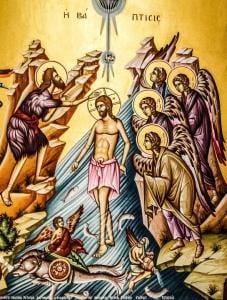
God’s revelation always serves as a vessel for grace. We must open ourselves to that grace, the point of such revelation, and not become overly attached to the vessel of that grace. We must embrace the spirit of the revelation if we want to receive its fruit. When revelation comes to us in the form of some locution, and we receive a text from it, we must engage the spirit of the text, and not be overly concerned with the letter. This is because if our focus is on the letter, on the vessel of revelation and the grace we are intended to receive, we lose sight of the point of the revelation and can easily cut ourselves off from its grace as we get sidetracked on all kinds of questions concerning the letter of the text. On the other hand, if we engage the spirit intended by that revelation, the meaning which transcends the vessel used to express it, we will open ourselves to what God desires us to experience from it; we will not be stuck with a dead letter because we will end up embracing God. Revelation always points beyond itself to the source of that revelation, God, and with it, the grace which God desires to give us. If we want to follow revelation proper, we will follow to what it points to instead of being stuck on the pointer, just as if we ask someone to point the direction we should go, we will not focus on their finger and all the fine points which can be had about their finger, but rather, the direction in which the finger is pointing.
When there is the need, God’s grace cleanses us of sin, but we must always remember, grace is not just about purification of sin, it is not just about our personal salvation; grace is given to us so that we can be deified. God desires to have us participate in the divine life, to participate in the love which is found between the three persons of the Trinity. God has made room for us, to be persons who engage the divine persons of the Trinity. God’s grace makes this possible. God sends us grace to make us greater; the more we embrace grace, the greater we can become. We are not intended to use it to recreate some ideal past. We are not meant to look back and seek for a golden age which we hope to reestablish in the present. Rather. We must look forward to something better, something far more magnificent than has ever been seen before, and this is possible because of God’s grace.
The Theophany, the revelation of the Trinity which occurred at the baptism of Jesus, was an event filled with great grace. God desired to show us how God can be and is love by the revelation of the three persons of the Trinity. As all revelation brings grace, the incomprehensible revelation of the Trinity brought equally incomprehensible graces to the world. Thus, when Jesus came to John, Jesus made it clear, he was to be baptized by John. Jesus knew that his baptism would allow for the revelation of the Trinity, even as he knew, it would bring great graces to the world, for by enlightening the world concerning the Trinitarian nature God opens up the possibility for the world to engage in those persons and receive the graces which it needed:
Then Jesus came from Galilee to the Jordan to John, to be baptized by him. John would have prevented him, saying, “I need to be baptized by you, and do you come to me?” But Jesus answered him, “Let it be so now; for thus it is fitting for us to fulfil all righteousness.” Then he consented. And when Jesus was baptized, he went up immediately from the water, and behold, the heavens were opened and he saw the Spirit of God descending like a dove, and alighting on him; and lo, a voice from heaven, saying, “This is my beloved Son, with whom I am well pleased.” (Matt. 3:13-17 RSV).
Jesus went to John the Baptist to be baptized; Jesus did not need to be cleansed from any sin; rather, he wanted to extend his grace to the whole of creation, using it to heal creation from the wounds of sin. The event was a Trinitarian event, as all three persons of the Trinity made themselves known. And therefore, in that revelation, God touched the world, lifting up all things with grace. God showed us that all things can be filled with grace. Water can be full of grace, and all that touches that water, can then likewise receive a share of that grace. Baptism can regenerate us because Jesus first went into the water and brought it the bounty of his grace. It is fitting, therefore, that at the baptism of Jesus, all three persons of the Trinity are revealed, because it shows us the greatness which is to be had in baptism, that when we are baptized, we will find ourselves interacting with and being embraced by all three persons of the Trinity. In baptism, we become children of God. We are drawn up into the divine life, allowing us to become, as it were, gods by grace.
God does not treat us as puppets without wills of our own. Even after we have become children of God, we can rebel. We can turn away from the prompting of the Spirit and become, as it were, spiritually dead. We are to take the grace given to us and cooperate with it, using it to overcome those inordinate passions which would lead us to such self-attachment, that is, to those passions which turn us away God and our neighbor as they encourage us to look after ourselves alone. God’s grace is not for use as a source of power, bending all things, even God, to our own will. Rather, it is offered to us to help us overcome all such self-attachment, all desire to control and dominate the world with Satanic might. With it, we are to fight those passions such as pride, hate, avarice and lust, those passions which lead us to ignore the needs of our neighbor by encouraging us to only be concerned about our own wants and desires. We are to receive grace so that, freed from the bondage of sin, we can then follow through with that grace and do what is good and just, take caring of our neighbors in our thanksgiving to God:
For the grace of God has appeared for the salvation of all men, training us to renounce irreligion and worldly passions, and to live sober, upright, and godly lives in this world, awaiting our blessed hope, the appearing of the glory of our great God and Savior Jesus Christ, who gave himself for us to redeem us from all iniquity and to purify for himself a people of his own who are zealous for good deeds (Tit. 3:11-14 RSV).
When we follow Christ’s example, when we get baptized, we receiving purifying grace, grace which cleanses us from our sins. We receive the Spirit which came down upon Christ. We are lifted up and so find ourselves joined in with Christ. And so, we are expected to follow after him, doing as he would do, to live our lives as christs in Christ. He did not look selfishly after himself; instead, he lived a life of radical love and devotion for others. Likewise, we must recognize that this is exactly what the Christian life should entail. When we seek after the graces of God, when we seek the peace of the Holy Spirit, we should seek to be like God, that is, we should be a child of God working for the good of all.
…but when the goodness and loving kindness of God our Savior appeared, he saved us, not because of deeds done by us in righteousness, but in virtue of his own mercy, by the washing of regeneration and renewal in the Holy Spirit, which he poured out upon us richly through Jesus Christ our Savior, so that we might be justified by his grace and become heirs in hope of eternal life (Tit. 3:4-7 RSV).
With baptism, the washing of regeneration, the renewal of the Holy Spirit, is given to us; we are brought into communion with God. We are welcomed to participate in and experience the divine life, the life of the God who is love. We are told we are to love, but it is up to us to follow through and love. If we take the grace given to us so we can love, we will be able to experience the glory of divine love, truly becoming a partaker of the divine nature and experience, at least in part, the eschatological glory of eternal life, for eternal life is the constant and eternal participation with that love.
The revelation of God at the baptism of Christ, the revelation of God as Trinity, was a cosmic event. Christ shared his grace with the water, and through it, the whole of material creation. Everything can be drawn to Christ and receive his grace. The world is not outside of his love. All of creation has its place in eternity. That is why the heavens and the earth will be new in eternity, for they, like us, are reconstituted by grace. Just like we find ourselves receiving the grace of God so we are already and not yet experiencing the eschaton, so God’s grace is also already and not yet with the rest of the world. Grace can be found all around is, in the world around is. God’s blessings can be and are received by material things. Water truly receives the Spirit and is made holy, and what that water touches, can be cleansed and made holy as well. We should not be surprised. This is how God works. God is an all-deifying God, and all things which have been made, will likewise find themselves drawn into God; all things which exist in time will have a place in eternity. If this were not so, what would have been the point of creation?
Stay in touch! Like A Little Bit of Nothing on Facebook.
If you liked what you read, please consider sharing it with your friends and family!













